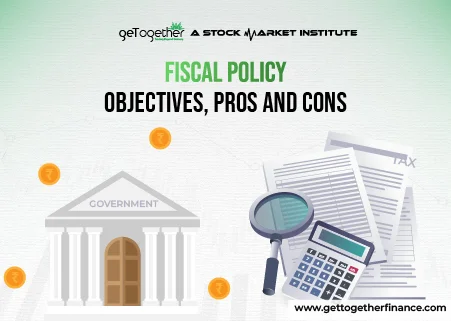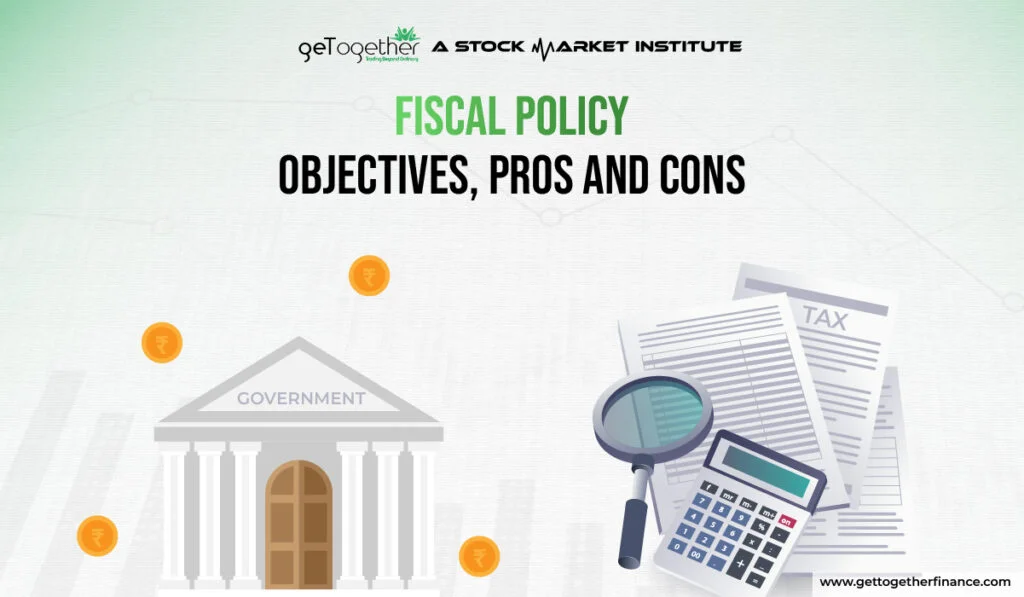Fiscal Policy: Objectives, Pros and Cons
- August 13, 2024
- 1682 Views
- by Manaswi Agarwal


Fiscal Policy is a mechanism used by the government to influence the overall economy of the country. It means the usage of spending and taxation to manage the economy that involves decisions related to government revenue and expenditure. These measures are taken to achieve specific economic objectives. In this blog we will deeply learn about the work of fiscal policy and how it influences the economy.
Table of Contents
ToggleWhat is Fiscal Policy?

Fiscal Policy is used by the government to promote strong and sustainable growth of the Indian economy. Fiscal policy refers to the government spending and taxation to influence the economy. India is a big economy and hence decisions taken by the government have an enormous impact on such a wider economy. Policies implemented by the government can affect the macro economy and financial markets.
Objectives of Fiscal Policy

The primary objectives of fiscal policy are:
Economy Management
The government uses fiscal policy with an aim to stimulate and sustain economic growth by undertaking measures that encourage investment, and consumption and boost the overall economic activity. To ascertain these several objectives, the government is spending on the country’s infrastructure, education and healthcare.
Equal Income Distribution
The implementation of fiscal policy or measures such as progressive taxation ensures equal distribution of resources and opportunities among different sections of the society.
Infrastructure Development
The objective of using fiscal policy is to increase the investments towards critical infrastructure projects for economic development. It helps to increase the investments in projects of transportation, energy, and telecommunication to facilitate long term development of the country.
Price Stability
One of the major objectives of using fiscal policy is to control inflation in the economy by maintaining price stability. The policy is also used to leverage money in the market during the times of recession in the economy.
Resources Mobilization
The government strives to balance revenue generation through tax or non-tax resources at the same time it ensures that fiscal deficit remains within manageable limits.
Instruments of Fiscal Policy

To bring a change in such a wider economy, there are several tools under the fiscal policy through which the government manages price stability with their implementation.
Government Receipts
The funds received by the government through tax funds, interests, investment gains, and payments for services with the help of which the government is able to finance its activities. Government Receipts are in the forms of capital and revenue receipts. Capital receipts are raised through borrowing or selling the assets which are utilized for the capital expenditure of the government. Revenue receipts are received from direct or indirect taxes to meet the regular expenditures of the government. Government stimulates economic growth by spending the money towards investment while creating more job opportunities.
Taxation
It is an instrument used to manage the flow of money in the economy. Central banks are responsible to adjust tax rates and tax structures in order to manage the economy. A deduction in the tax rates increases disposable income for the consumer and hence spending as well as investment is increased. Conversely, an increase in taxes results in reducing inflation to stabilize the economy.
Transfer Payments
Transfer payment is a tool of fiscal policy which is utilized by the government to help individuals who are in need by providing unemployment benefits, pensions and social security. It allows the government to maintain consumption levels while the economy is facing downturns.
Subsidies
Subsidies are given by the government as a form of relief to the people belonging below the poverty line. It ensures an equal distribution of the resources into different sections of the society. Moreover, financial assistance is given to businesses related to the agriculture sector to promote economic activities and stabilize price movements.
Also Read: Monetary Policy
How does fiscal policy affect the stock market?

Any kind of changes in tax policies impact the portfolio of an investor, when corporate taxes are reduced by the government, this will lead to increase in the stock prices as companies will tend to retain more profits which gives a boost to the investments. Conversely, when there is a hike in tax prices, profitability is affected which prompts investors to reassess the valuation of the company for their investments.
Importance of Fiscal Policy in India
Government needs to take effective measures in order to control the economic movements in the country. Implementing fiscal policies play a major role in maintaining price stability as well as control inflation.
· During times of inflation, it becomes necessary to implement fiscal policies to control the flow of money and regulate demand as well as maintain price stability.
· Implementing fiscal policies stimulates economic growth by increasing the public expenditure and investments into key sectors of the economy.
· The use of fiscal policy also ensures to achievement social and developmental goals by contributing towards providing quality education, healthcare, transportation, and infrastructure and fostering inclusive growth.
Challenges and Considerations of Fiscal Policy

Implementing fiscal policies requires good knowledge so that its negative side can also be managed at the right time. Policymakers must be well known about the incorrect implications of fiscal policies as this can disturb the economic activities.
Timing Issues
The implementation of the policies by the government must follow correct timings which is difficult to understand. It becomes quite difficult for policymakers to decide appropriate fiscal measures.
Political Challenges
Political instability impacts fiscal policies, political interference can lead to delay in policy decision making while several agendas and election cycles lead to suboptimal decisions focused on short term gains instead of long term stability.
Budget Deficit
Increasing government spending and tax often lead to budget deficits which can prove to be unsustainable. This might often limit the government’s ability to deal with future economic crises.
Final Thoughts
Fiscal policy is an efficient tool used by the government to maintain economic downturns and to stabilize every movement of the economy. Policymakers efficiently use instruments such as subsidies, taxation policies, and government spendings to smoothly run the economic activities.
FAQs
What is Fiscal Policy?
Fiscal Policy is government spending and taxation to influence the economy. The policies are undertaken to regulate economic movements and control inflation as well as economic downturns.
What are the objectives of Fiscal Policy?
The primary objective of fiscal policy is to stabilize price movements in the economy and ensure better employment opportunities for people.
What are the tools of Fiscal Policy?
Government spending, taxation, deficit financing, public expenditure, subsidy, etc are the main tools of fiscal policy through which the government aims to stabilize economic growth.
How Fiscal policy is beneficial for the economy?
Fiscal policy helps in stabilizing the prices through taxation and other tools used by the government. These policies maintain aggregate demand in the economy and contribute towards the deficit by drawing down budget surpluses.



 Instagram
Instagram
